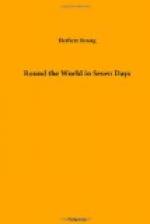Now he turned south-east once more, crossed the Chandaur chain, and presently came in sight of the Godaveri river, which traverses the whole breadth of Hyderabad. Near Indor he left the river on his left. By this time it was becoming dark. Smith still slept, and Rodier, who was not able to steer by the stars, was considering whether he had not better waken his employer when he spied the characteristic glare from a locomotive furnace far ahead. In half-a-minute he had caught up the train, and slowed down to make sure of the direction in which the railway ran. He found that it was almost exactly south-south-east, and concluded from a glance at the map that he was above the connection of the Hyderabad railway running from Warangal to the coast of the Bay of Bengal. Reassured, he resolved to let Smith have his sleep out, followed the line until it swept eastward at Secunderabad, and then, steering a little to the left, put the engine once more to full speed. In less than an hour afterwards he saw a vast expanse of water glistening in the light of the rising moon, and knew that he had reached the sea.
Being by this time thoroughly stiff and tired, and knowing, moreover, that Smith would navigate the aeroplane over the sea with much more certainty than himself, he shouted to awaken him. This proving ineffectual, he leant over and nudged his shoulder. Smith was awake in an instant.
“Where are we?” he cried; but no answer was necessary; he saw the sea below him, and stretching far to the east, north, and south. He exchanged places with Rodier, who, too tired even to eat, fell asleep at once.
“Good thing he woke me,” thought Smith. It was one thing to fly over land, with guiding marks in the shape of rivers, mountains, and other physical features that could be recognized more or less easily from the map; and quite another to cross the pathless ocean. But with a compass and a clear sky the course would present no difficulty to a seaman, and Smith settled down to a flight that would be without obstruction for at least seven hundred miles.
He knew that in the Bay of Bengal the prevailing wind at that season is south-westerly. Whether there was any wind or not it was impossible to ascertain while the aeroplane was maintaining its enormous speed; certainly there was none to cause unsteadiness. If wind there was, it blew in his, favour, and all that he would have to do would be to allow in steering for a slight northerly drift. He would certainly sight the Nicobar group, and possibly the Andaman Islands if he did not make sufficient allowance for the wind; but he was determined not to alight if he could help it until he arrived at Penang; he had lost time enough already.




